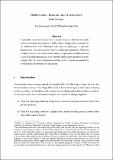Files in this item
Deliberation, reasons, and alternatives
Item metadata
| dc.contributor.author | Snedegar, Justin | |
| dc.date.accessioned | 2020-11-05T00:38:08Z | |
| dc.date.available | 2020-11-05T00:38:08Z | |
| dc.date.issued | 2019-09-27 | |
| dc.identifier | 256174085 | |
| dc.identifier | fb780b0e-4514-4600-9890-3a21d6770676 | |
| dc.identifier | 85056088613 | |
| dc.identifier | 000487838700001 | |
| dc.identifier.citation | Snedegar , J 2019 , ' Deliberation, reasons, and alternatives ' , Pacific Philosophical Quarterly , vol. 100 , no. 3 , pp. 682-702 . https://doi.org/10.1111/papq.12262 | en |
| dc.identifier.issn | 0279-0750 | |
| dc.identifier.other | ORCID: /0000-0002-2552-0702/work/64697915 | |
| dc.identifier.uri | https://hdl.handle.net/10023/20903 | |
| dc.description.abstract | A plausible constraint on normative reasons to act is that it must make sense to use them as premises in deliberation. I argue that a central sort of deliberation – what Bratman calls partial planning – is question‐directed: it is over, and aims to resolve, deliberative questions. Whether it makes sense to use some consideration as a premise in deliberation in a case of partial planning can vary with the deliberative question at issue. I argue that the best explanation for this is that reasons are contrastive or relativized to deliberative questions. | |
| dc.format.extent | 234485 | |
| dc.language.iso | eng | |
| dc.relation.ispartof | Pacific Philosophical Quarterly | en |
| dc.subject | Deliberation | en |
| dc.subject | Reasons | en |
| dc.subject | Alternatives | en |
| dc.subject | Ethics | en |
| dc.subject | Reasoning | en |
| dc.subject | B Philosophy (General) | en |
| dc.subject | T-NDAS | en |
| dc.subject.lcc | B1 | en |
| dc.title | Deliberation, reasons, and alternatives | en |
| dc.type | Journal article | en |
| dc.contributor.institution | University of St Andrews. Philosophy | en |
| dc.identifier.doi | 10.1111/papq.12262 | |
| dc.description.status | Peer reviewed | en |
| dc.date.embargoedUntil | 2020-11-05 |
This item appears in the following Collection(s)
Items in the St Andrews Research Repository are protected by copyright, with all rights reserved, unless otherwise indicated.

